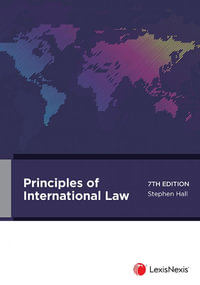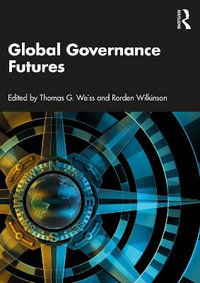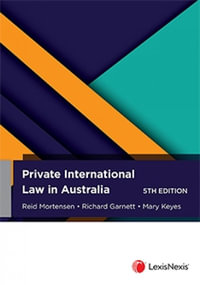
Sovereignty and Interpretation of International Norms
By: Carlos Fernández de Casadevante y Rom
Hardcover | 20 February 2007
At a Glance
340 Pages
23.39 x 15.6 x 2.06
Hardcover
$264.27
or 4 interest-free payments of $66.07 with
orAims to ship in 7 to 10 business days
In an International Community characterized by the weight of state sovereignty the interpretation of international norms (by states, International Organizations and judicial and arbitral bodies) is one of the key points of this legal order. State sovereignty conditions the creation and application of International Law as well as the settlement of disputes. That's why the intervention of judicial and arbitral bodies acquire a great importance.
This work contents a comprehensive and critic approach to international judicial and arbitral case law concerning interpretation of international norms and international institutions as well as to the way the International Court of Justice conceives access to its jurisdiction ant its exercise. So, conventional instruments and instruments of a statutory nature, customary norms, institutional norms of the United Nations, unilateral declarations, as well as procedural instruments, facts alleged and the exercise of the jurisdiction attributed to the International Court of Justice - in the way they have been interpreted by the Court - constitute the object of a work surely useful for persons involved in international practice, studies or teaching.
| Interpretation of International Norms: Sovereignty, Power of Discretion, Delimitation of the Discrepancy | |
| Sovereignty and Interpretation: A Relationship of Dependence | p. 3 |
| The sovereignty of the State conditions the interpretation of international norms: Discrepancy, discretion. Persistence of the problem | p. 3 |
| The efforts to modulate the power of discretion of the State: Good faith or a principle with blurred edges | p. 14 |
| Types and methods of interpretation: A classification based on international practice | p. 23 |
| The Text, the Authentic Expression of the Will of the Parties, Constitutes the Subject of the Discrepancy: The Conventional Rules | p. 37 |
| Language, the instrument of sovereignty | p. 37 |
| The judicial limiting of a process which is heavily dependent on the autonomy of the will of the State: The interpretative norms of the Vienna Conventions of 1969 and 1986 | p. 44 |
| The Institutionalisation of the International Community Gives a New Dimension to Law Making: The Institutional Norms | p. 63 |
| The need for an open mind or the teaching of practice: The resolutions of the United Nations General Assembly | p. 63 |
| The examination of the attitude of the State is the determining factor: Criteria | p. 75 |
| Conduct, the Expression of the Will of the State, Constitutes the Subject of the Discrepancy: The Customary Norms | p. 85 |
| The conduct of the State and its appreciation are tributaries of sovereignty | p. 85 |
| The interpreter limits the discretion of the State. The conception of the interpreter prevails as regards the discrepancy: The dependence of the State | p. 94 |
| Does the Declaration Express the Will of the State or Is It theInterpreter Who Builds It? The Unilateral Declarations | p. 107 |
| Another sign of the dependence of the State with regard to the interpreter: The determination of the effects of the declaration | p. 107 |
| The criteria retained by the interpreter in order to affirm the binding character of the declaration | p. 108 |
| The declarations of acceptance of the obligatory jurisdiction of the ICJ | p. 121 |
| Analysis of International Practice: The Interpretative Canons Employed by International Case Law | |
| The International Court of Justice (I.C.J.) | p. 129 |
| Introduction | p. 129 |
| General canons employed | p. 134 |
| The natural and ordinary meaning of the terms | p. 134 |
| The context | p. 138 |
| The object and purpose of the treaty | p. 141 |
| The subsequent practice | p. 143 |
| The preparatory work | p. 145 |
| Treaties authenticated in two or more languages | p. 147 |
| The intention of the Parties | p. 148 |
| The rule of practical effect | p. 151 |
| The spirit of the treaty | p. 151 |
| Equity | p. 152 |
| Inter-temporal law | p. 153 |
| Does the I.C.J. use the interpretative canons as they were conceived by the I.L.C.? | p. 155 |
| Arbitral Tribunals | p. 159 |
| Introduction | p. 159 |
| General Criteria Employed | p. 160 |
| The natural and the ordinary meaning of the terms | p. 160 |
| The context | p. 163 |
| The object and purpose of the treaty | p. 166 |
| The subsequent practice | p. 167 |
| Preparatory works | p. 169 |
| Treaties authenticated in two or more languages | p. 172 |
| The intention of the Parties | p. 174 |
| The rule of practical effect | p. 176 |
| Does the arbitral jurisprudence use the interpretative canons as they were conceived by the I.L.C.? | p. 176 |
| Rules and Criteria Employed in Relation to the Interpretation of Certain Categories of Norms and International Instruments | |
| Conventional Instruments or Instruments of a Statutory Nature | p. 181 |
| Interpretation of treaties stricto sensu | p. 181 |
| The Charter of the United Nations | p. 181 |
| The system of Mandates and the validity of the obligations inherent to it despite the disappearance of the League of Nations | p. 191 |
| The right of self-determination of peoples | p. 194 |
| A joint communiqué can be an international agreement or the question of the form of international agreements | p. 198 |
| The exercise of consular functions relating to nationals of the sending State | p. 199 |
| Article 36, paragraph (b) creates individual rights | p. 202 |
| The presence of two elements: The right to be informed (A) "without delay" (B) | p. 203 |
| The "centre of the main channel" as a criterion in order to determine the boundary of an international river | p. 206 |
| The application of international humanitarian law and international conventions of human rights to occupied territories | p. 212 |
| The competence of the General Assembly to make recommendations | p. 216 |
| Customary Norms | p. 219 |
| The general theory of custom | p. 219 |
| Reservations to treaties | p. 219 |
| The concept of "terra nullius" | p. 221 |
| The principle of equidistance in the delimitation of continental shelves between two or more States | p. 222 |
| The principle of "uti possidetis juris" | p. 224 |
| The legality of the threat or use of nuclear weapons | p. 226 |
| Immunity from criminal jurisdiction in other States and also inviolability of an incumbent Minister for Foreign Affairs | p. 229 |
| Immunities in customary international law | p. 230 |
| The concept of occupied territory and international obligations resulting for the occupying Power | p. 235 |
| Legal consequences of the commission of an internationally wrongful act | p. 238 |
| Institutional Norms of the United Nations | p. 243 |
| Resolutions of the General Assembly | p. 243 |
| Resolutions of the Security Council | p. 245 |
| Unilateral Declarations | p. 247 |
| Unilateral declarations stricto sensu | p. 247 |
| Declarations of acceptance of the jurisdiction of the I.C.J | p. 247 |
| Procedural Instruments, Facts Alleged and Exercise of the Jurisdiction Attributed to the I.C.J | p. 251 |
| Access to the Court in the light of Article 35, paragraph 2, of the Statute of the I.C.J | p. 251 |
| The liberty of the I.C.J. to interpret the request and the conclusions of the Parties | p. 258 |
| Appraisal of the facts alleged and their proof | p. 262 |
| Has the I.C.J. discretional powers to decide the exercise of the jurisdiction attributed to it? | p. 263 |
| Value and legal effects of an order stating provisional measures | p. 265 |
| The jurisdiction of the Court to give advisory opinions | p. 271 |
| The "legal question" as object of the advisory opinion requested | p. 279 |
| The lack of clarity of the terms of the request and its effects on the "legal nature" of the question referred to the Court | p. 279 |
| The "abstract nature" of the question posed to the Court | p. 281 |
| The lack of jurisdiction because of the "political" character of the question posed to the Court | p. 281 |
| The question of the lack of consent to the Court's jurisdiction by interested States and its consequences on the Court's jurisdiction to give an advisory opinion | p. 282 |
| The question of the purpose of advisory opinions | p. 284 |
| The use the General Assembly would make of an advisory opinion | p. 284 |
| Conclusions | p. 287 |
| Bibliography and International Case Law | |
| Bibliography | p. 305 |
| International Case Law | p. 317 |
| Arbitral | p. 317 |
| P.C.I.J | p. 320 |
| I.C.J | p. 321 |
| Table of Contents provided by Publisher. All Rights Reserved. |
ISBN: 9783540682066
ISBN-10: 3540682066
Published: 20th February 2007
Format: Hardcover
Language: English
Number of Pages: 340
Audience: Professional and Scholarly
Publisher: Springer Nature B.V.
Country of Publication: DE
Dimensions (cm): 23.39 x 15.6 x 2.06
Weight (kg): 0.65
Shipping
| Standard Shipping | Express Shipping | |
|---|---|---|
| Metro postcodes: | $9.99 | $14.95 |
| Regional postcodes: | $9.99 | $14.95 |
| Rural postcodes: | $9.99 | $14.95 |
How to return your order
At Booktopia, we offer hassle-free returns in accordance with our returns policy. If you wish to return an item, please get in touch with Booktopia Customer Care.
Additional postage charges may be applicable.
Defective items
If there is a problem with any of the items received for your order then the Booktopia Customer Care team is ready to assist you.
For more info please visit our Help Centre.
























